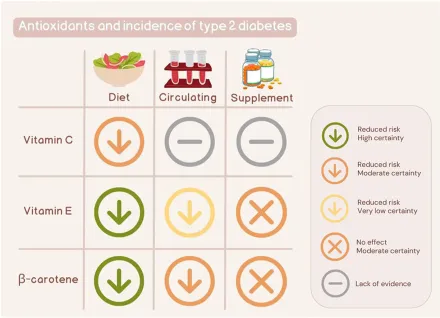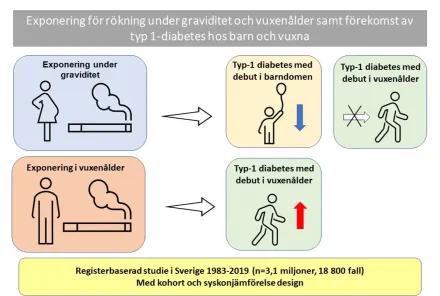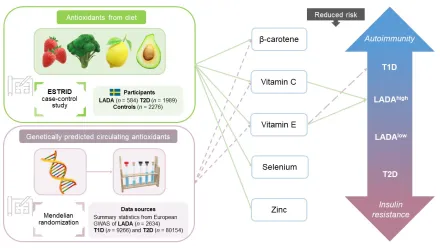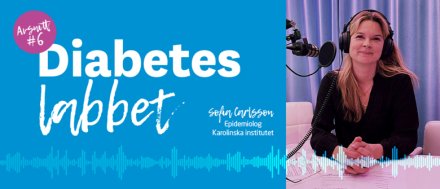
ESTRID
Welcome to the ESTRID study!
We are a research group at Karolinska Institutet, Stockholm, Sweden. Our goal is to find risk factors for the development of LADA (latent autoimmune diabetes in adults) and type 2 diabetes. We study genetic and lifestyle factors as well as how these interact. The overall aim is to increase the possibilities to prevent diabetes. ESTRID is short for Epidemiological study of risk factors for LADA and type 2 diabetes.
 Photo: -
Photo: -Information for study participants
Click here for more information about how you can answer the ESTRID study questionnaire about family, life style and health

Follow us on Twitter
Stay up to date about activites and publications from ESTRID
News

No overall risk between antibiotic exposure and LADA
An elevated risk for LADA was observed for individuals exposed to narrow-spectrum antibiotics 6–10 years prior to diagnosis, a result driven by data from the ESTRID study.

Having an autoimmune disease is linked to an increased risk of LADA
Especially for individuals with high autoantibody levels, having an autoimmune disease can increase the risk of developing LADA.

Early-life factors play small role in adult-onset T1D
The study suggests that early life factors have less of an impact on the development of T1D in adulthood than the onset of the disease in childhood, suggesting that other triggers later in life are likely to be more important.

New insights into adult-onset type 1 diabetes
Having a first-degree relative with the condition significantly increases the risk of developing type 1 diabetes as an adult and the risk is higher if the relative developed diabetes early.

Moderate intake of dietary antioxidants may lower T2D risk
A recent systematic review and meta-analysis shows that a moderate intake of vitamins C and E and β-carotene may reduce the risk of T2D by mitigating insulin resistance.

Prior diagnosis of infection does not increase the risk of LADA
Despite a link between childhood infections and the development of type 1 diabetes, no significant association was found between a previous diagnosis of infection and latent autoimmune diabetes in adults (LADA).

Smoking can increase the risk of type 1 diabetes
Adult smoking appears to increase the risk of adult-onset type 1 diabetes, with stronger effects in those with a family history of diabetes, highlighting the importance of investigating modifiable risk factors for adult-onset type 1 diabetes.

Need for improved treatment in autoimmune diabetes in adults
To reduce the risk of complications, it is important to measure antibodies in individuals who develop diabetes in adulthood, while also considering the levels of these antibodies.

Vitamin E may have a protective effect on LADA
A new study based on ESTRID shows that vitamin E may play a protective role in the development of LADA, possibly by inhibiting the development of autoimmunity and preventing insulin resistance. In particular, a higher intake of vitamins C and E was associated with a lower risk of LADA.

Type 1 diabetes = adult-onset diabetes?
In the latest episode of the Diabeteslabbet podcast, Sofia Carlsson, associate professor and principal investigator of the ESTRID study, talks about common misconceptions about who gets type 1 diabetes and how research can raise awareness and thus reduce the risk of misdiagnosis.

Childhood obesity linked to increased risk of different forms of diabetes in adulthood
Increased risk of developing diabetes in adulthood for children with obesity. The risk of developing the most autoimmune form of diabetes was three times as high, shows a new study from Karolinska Institutet.

Low birth weight and adult overweight increase the risk of LADA and type 2-diabetes in adults
Low birth weight and adult overweight increase the risk of developing LADA and type 2-diabetes in adults, a new study from Karolinska Institutet has found. The study was conducted using Mendelian Randomization to study the connection between birth weight, adult overweight and the risk of LADA.

Increased risk of LADA in people who smoke or use smokeless tobacco
People who smoke or use smokeless tobacco have an increased risk of developing Latent Autoimmune Diabetes in Adults (LADA) a new study from Karolinska Institute shows. The study investigated how tobacco use and genetic susceptibility affect the risk of developing LADA.

Long-term breastfeeding may reduce the risk of type 1 diabetes in children
Long-term breastfeeding and later introduction to gluten, cow's milk and fruit may reduce the risk of developing type 1 diabetes in children, a new literature review shows. Overall, the existing research suggests that diet in the first year of life may have an impact on children's risk of developing type 1 diabetes.

A healthy lifestyle reduces the risk of LADA and Type 2 diabetes
Findings from a recently published study in Diabetes Research and Clinical Practice show that a healthy lifestyle is associated with a 49% reduction in the risk to develop Latent autoimmune diabetes in adults (LADA). This study was based on data from the ESTRID study and found that the association between a healthy lifestyle and reduced diabetes risk was also seen in individuals with a family history of diabetes and a high genetic risk of developing diabetes.

High dietary fish intake reduces the risk of diabetes among individuals with GAD antibodies
Individuals with GAD antibodies are at increased risk of developing LADA. A new study shows that the risk of diabetes is particularly high among those who also have low fish intake.

High physical activity reduces the risk of LADA and type 2 diabetes
Exercising for 30 minutes three times per week is associated with a 40% reduced risk of Latent Autoimmune Diabetes in Adults (LADA), but only in individuals who do not have a high genetic risk of developing diabetes. High physical activity is also associated with a 50% reduced risk of type 2 diabetes, regardless of genetic susceptibility.

Consumption of processed red meat increases the risk of LADA
Consumption of processed red meat, such as sausage and bacon, is linked to an increased risk of developing LADA. The risk is particularly high in people with high-risk genes for autoimmune diabetes.

Increased body weight does not fully explain the association between sweetened beverages and diabetes
In a new study, Phd student Josefin Löfvenborg further investigates how sweeteend beverage consumption affects the risk of diabetes.

New report about environmental and lifestyle factors related to diabetes
A new report summarizes existing research on the relationship between lifestyle, environmental factors and the development of diabetes. Emphasis is placed on type 2 diabetes, which is the most common form of diabetes, but also type 1 diabetes and LADA are discussed. Sofia Carlsson, responsible researcher for the ESTRID study, has led the work with the report.

ESTRID has received VR and FORTE funding
The two grants totals more than 10 000 000 SEK and should be used for the study of risk factors and prognosis for LADA (latent autoimmune diabetes in adults).

Overweight and genotype interact in the development of LADA
Overweight individuals carrying highrisk genes are at a significantly higher risk of developing LADA shows a new study.
About ESTRID
 Photo: Tookapic Pexels
Photo: Tookapic PexelsAbout us
 Photo: Anthony,Pexels
Photo: Anthony,PexelsDiabetes
 Photo: Pixabay
Photo: PixabayThe study
 Photo: Vikas Sawant
Photo: Vikas Sawant